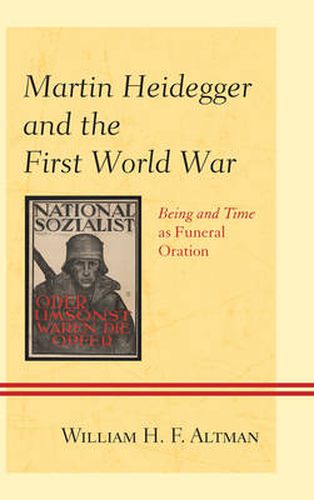Readings Newsletter
Become a Readings Member to make your shopping experience even easier.
Sign in or sign up for free!
You’re not far away from qualifying for FREE standard shipping within Australia
You’ve qualified for FREE standard shipping within Australia
The cart is loading…






In a 1934 speech, marking the Twenty-fifth Reunion of his high school class, Martin Heidegger spoke eloquently of classmates killed in the Great War and called on his audience to recognize that the national rebirth now occuring in Hitler’s Germany must continue to draw inspiration from the war dead. In this process, he refers to the war of 1914-1918 as the First World War. Since the condition for the possibility of the First is a Second World War, Martin Heidegger and the First World War raises the question: how could Heidegger have already known in 1934 that another war was coming? The answer is to be found by reading Being and Time (1927) as a funeral oration for the warriors of the Great War, a reading that validates Heidegger’s paradoxical claim that the genuinely historical must emerge from the future. By using Lincoln’s Gettysburg Address as an archetype of the genre, William H. F. Altman shows that Heidegger’s concept of temporality in Being and Time replicates the way past, present, and future interweave in the classic funeral oration and argues that if there is a visible path connecting Being and Time to its author’s subsequent decision for National Socialism, it runs through the trenches of the Great War and its author’s successful attempt to evade them. The analysis and conclusions in this book will be of great value to students and scholars interested in philosophy, history, intellectual history, German studies, and political science.
$9.00 standard shipping within Australia
FREE standard shipping within Australia for orders over $100.00
Express & International shipping calculated at checkout
In a 1934 speech, marking the Twenty-fifth Reunion of his high school class, Martin Heidegger spoke eloquently of classmates killed in the Great War and called on his audience to recognize that the national rebirth now occuring in Hitler’s Germany must continue to draw inspiration from the war dead. In this process, he refers to the war of 1914-1918 as the First World War. Since the condition for the possibility of the First is a Second World War, Martin Heidegger and the First World War raises the question: how could Heidegger have already known in 1934 that another war was coming? The answer is to be found by reading Being and Time (1927) as a funeral oration for the warriors of the Great War, a reading that validates Heidegger’s paradoxical claim that the genuinely historical must emerge from the future. By using Lincoln’s Gettysburg Address as an archetype of the genre, William H. F. Altman shows that Heidegger’s concept of temporality in Being and Time replicates the way past, present, and future interweave in the classic funeral oration and argues that if there is a visible path connecting Being and Time to its author’s subsequent decision for National Socialism, it runs through the trenches of the Great War and its author’s successful attempt to evade them. The analysis and conclusions in this book will be of great value to students and scholars interested in philosophy, history, intellectual history, German studies, and political science.